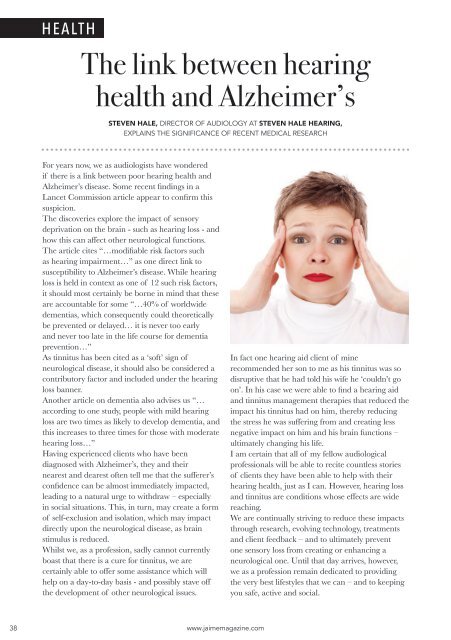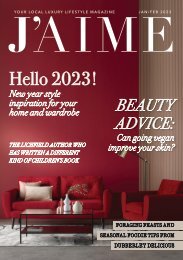J'AIME March 2021
Your local luxury lifestyle magazine
Your local luxury lifestyle magazine
Create successful ePaper yourself
Turn your PDF publications into a flip-book with our unique Google optimized e-Paper software.
H E A LT H<br />
The link between hearing<br />
health and Alzheimer’s<br />
STEVEN HALE, DIRECTOR OF AUDIOLOGY AT STEVEN HALE HEARING,<br />
EXPLAINS THE SIGNIFICANCE OF RECENT MEDICAL RESEARCH<br />
For years now, we as audiologists have wondered<br />
if there is a link between poor hearing health and<br />
Alzheimer’s disease. Some recent findings in a<br />
Lancet Commission article appear to confirm this<br />
suspicion.<br />
The discoveries explore the impact of sensory<br />
deprivation on the brain - such as hearing loss - and<br />
how this can affect other neurological functions.<br />
The article cites “…modifiable risk factors such<br />
as hearing impairment…” as one direct link to<br />
susceptibility to Alzheimer’s disease. While hearing<br />
loss is held in context as one of 12 such risk factors,<br />
it should most certainly be borne in mind that these<br />
are accountable for some “…40% of worldwide<br />
dementias, which consequently could theoretically<br />
be prevented or delayed… it is never too early<br />
and never too late in the life course for dementia<br />
prevention…”<br />
As tinnitus has been cited as a ‘soft’ sign of<br />
neurological disease, it should also be considered a<br />
contributory factor and included under the hearing<br />
loss banner.<br />
Another article on dementia also advises us “…<br />
according to one study, people with mild hearing<br />
loss are two times as likely to develop dementia, and<br />
this increases to three times for those with moderate<br />
hearing loss…”<br />
Having experienced clients who have been<br />
diagnosed with Alzheimer’s, they and their<br />
nearest and dearest often tell me that the sufferer’s<br />
confidence can be almost immediately impacted,<br />
leading to a natural urge to withdraw – especially<br />
in social situations. This, in turn, may create a form<br />
of self-exclusion and isolation, which may impact<br />
directly upon the neurological disease, as brain<br />
stimulus is reduced.<br />
Whilst we, as a profession, sadly cannot currently<br />
boast that there is a cure for tinnitus, we are<br />
certainly able to offer some assistance which will<br />
help on a day-to-day basis - and possibly stave off<br />
the development of other neurological issues.<br />
In fact one hearing aid client of mine<br />
recommended her son to me as his tinnitus was so<br />
disruptive that he had told his wife he ‘couldn’t go<br />
on’. In his case we were able to find a hearing aid<br />
and tinnitus management therapies that reduced the<br />
impact his tinnitus had on him, thereby reducing<br />
the stress he was suffering from and creating less<br />
negative impact on him and his brain functions –<br />
ultimately changing his life.<br />
I am certain that all of my fellow audiological<br />
professionals will be able to recite countless stories<br />
of clients they have been able to help with their<br />
hearing health, just as I can. However, hearing loss<br />
and tinnitus are conditions whose effects are wide<br />
reaching.<br />
We are continually striving to reduce these impacts<br />
through research, evolving technology, treatments<br />
and client feedback – and to ultimately prevent<br />
one sensory loss from creating or enhancing a<br />
neurological one. Until that day arrives, however,<br />
we as a profession remain dedicated to providing<br />
the very best lifestyles that we can – and to keeping<br />
you safe, active and social.<br />
38 www.jaimemagazine.com

















